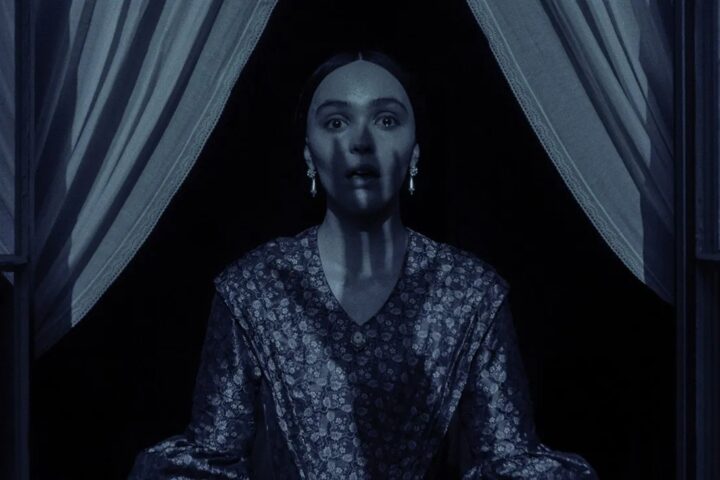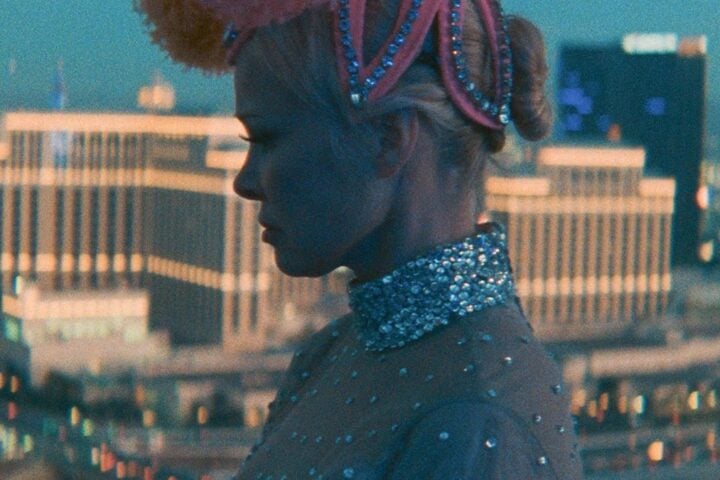In one of the narratives that directors Michael Dweck and Gregory Kershaw braid together in Gaucho Gaucho, their documentary on that much-represented Argentine figure, the mestizo horseman of the Pampas, a father teaching his son the gaucho tradition asks him what he wants to be when he grows up. A gaucho, the boy replies, “but a gaucho gaucho”—not a faux gaucho, that is, but a real one. Here we have a source for the film’s title, but considering what Gaucho Gaucho actually depicts (and what it doesn’t), this doubling smacks of a mirror image, where it’s tricky to distinguish the real from the reflection.
Shot in luxuriant black and white by Dweck and Kershaw, the film follows a handful of gauchos from three generations, but from a distance, letting their stories unfold without the intervention of voiceover commentary. Considered for its cinematography, shot composition, and motifs alone, Gaucho Gaucho is nothing if not a pleasure to watch. Numerous long takes relish in a languid, unbroken sense of time, lingering past the point where the people and their horses have left the frame, only for a dog to lope across as a sort of coda.
The most affecting of these threads follows Guada, a teenage girl who’s decided not to have children in order to participate in rodeos and live as a gaucha in defiance of her machista culture. In a film visually stunning yet oddly slack, Guada’s story stands out because of her struggle. We feel for her when she’s reprimanded by an administrator for wearing the wide-brimmed beret of her traditional costume instead of a school uniform, or when she hobbles across the frame on crutches after being thrown from a horse in her first rodeo, because these moments don’t paper over the contradictions and complexities of her tradition. Even so, we see suspiciously little pushback on her decision. Everyone from her father to her competitors offers support and encouragement. Her hardest task is winning the trust of her horse.
Another scene in which the father shows his son how to make rope reflects the film’s braided structure, which alternates between several narratives to give a sense of the gauchos as a community. This form would be well-executed were it not conspicuously lacking in certain threads that would show us what this community exists in relation to. Because it’s filled with so many undeveloped stories, while at the same time excluding stories from outside the community, or even at its margins, it ends up lassoing romantic tropes more than real people.
Gaucho Gaucho sidesteps the question of how gauchos fit (or don’t) into the wider context of contemporary Argentine society, what these people maintain their tradition in the face of. And the black-and-white cinematography only aggravates the documentary’s mythic, atemporal, apolitical atmosphere, such that the gauchos’ talk of draught and condors killing their calves seems to stand in for other existential threats. In the end, Gaucho Gaucho presents a way of life where the only friction is between “man” and “nature.”
In this way, Dweck and Kershaw fall into a long tradition of artists and politicians projecting their ideas onto the gaucho to serve their own ends. The genre of gauchesque poetry epitomized by José Hernández’s 1872 epic poem The Gaucho Martín Fierro only came into existence after gauchos began to lose their centrality to Argentina’s economy. By the early 20th century, the all-but-vanished gaucho reappears in the shape of a nationalistic, reactionary myth in the writings of Leopoldo Lugones. Maybe the lesson here is that the gaucho no longer exists except as an idea—that is, unreality is precisely its reality.
And yet, these are real people who the filmmakers have set out to document, and Gaucho Gaucho does them a disservice by reducing them to symbols. Though sadly underdeveloped, Guada’s story somewhat redeems this misstep. By challenging what it means to be a gaucho, she throws that definition into stark relief, evenas she embodies values extrinsic to a tradition that, like most, must be malleable rather than brittle if it’s to survive. Turns out, the real gaucho—the gaucho gaucho—may actually be the gaucha.
Since 2001, we've brought you uncompromising, candid takes on the world of film, music, television, video games, theater, and more. Independently owned and operated publications like Slant have been hit hard in recent years, but we’re committed to keeping our content free and accessible—meaning no paywalls or fees.
If you like what we do, please consider subscribing to our Patreon or making a donation.



